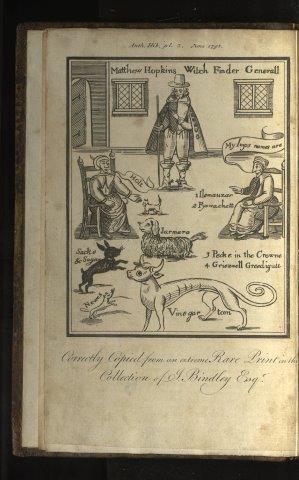
London: Printed for R. Knaplock and D. Midwinter, 1718
This illustration is “Matthew Hopkins Witchfinder general,” a 1793 reproduction of a well-known 1647 woodcut. The image was inserted as a frontispiece in the book after its publication.
Philip Gardiner Nordell (1894-1976), graduated from Dartmouth College in 1916, where he was an All-American in the running broad jump. He claimed to have invented the predecessor to boxed cake mixes in the 1920s—founding a business that combined the dry ingredients for muffins, allowing the baker to simply add water. Nordell’s primary research interest was early American lotteries, which he studied for over thirty years. His personal collection of early lottery tickets and related newspaper announcements, brochures, and broadsides, is now at Princeton University.
Nordell also assembled an extraordinary collection of books documenting religion, politics, and science in Britain and New England in the 17th and 18th centuries.
Temple Special Collections acquired this collection from Nordell in 1965. It contains more than 250 books, including a significant number of rare British and American imprints on religion from the 17th and 18th centuries. The collection documents the predominant and often conflicting ideas during this period, particularly related to religion, religious liberty, and rationalism in England and the New England colonies. Included in the collection are many books on “fringe” groups, such as Anabaptists, Levellers, Ranters, and atheists, as well as many works on witchcraft. Authors represented include Francis Bacon, John Cotton, Thomas Edwards, Joseph Glanvill, Thomas Hobbes, John Lilburne, Cotton Mather, and William Prynne.
Of particular interest are the books on witchcraft which represent a very comprehensive view of the topic. Originating on both sides of the Atlantic, they document the conversation that old and new worlds were having about sources, causes, and cures for witchcraft–and the eventual repudiation of the belief that witches exist.
In a 1965 letter, Nordell said: “My central aim in gathering the collection has been to furnish important source material helpful in appraising the comparative mental patterns in old and New England.… In different words, the collection furnishes much of the basic source material to form a sound judgment as to the truth of an observation made in the 1640′s, that while New England was becoming old, old England was becoming new.”
–Margery Sly, Director of Special Collections, and Katy Rawdon, Coordinator of Technical Services, Special Collections Research Center